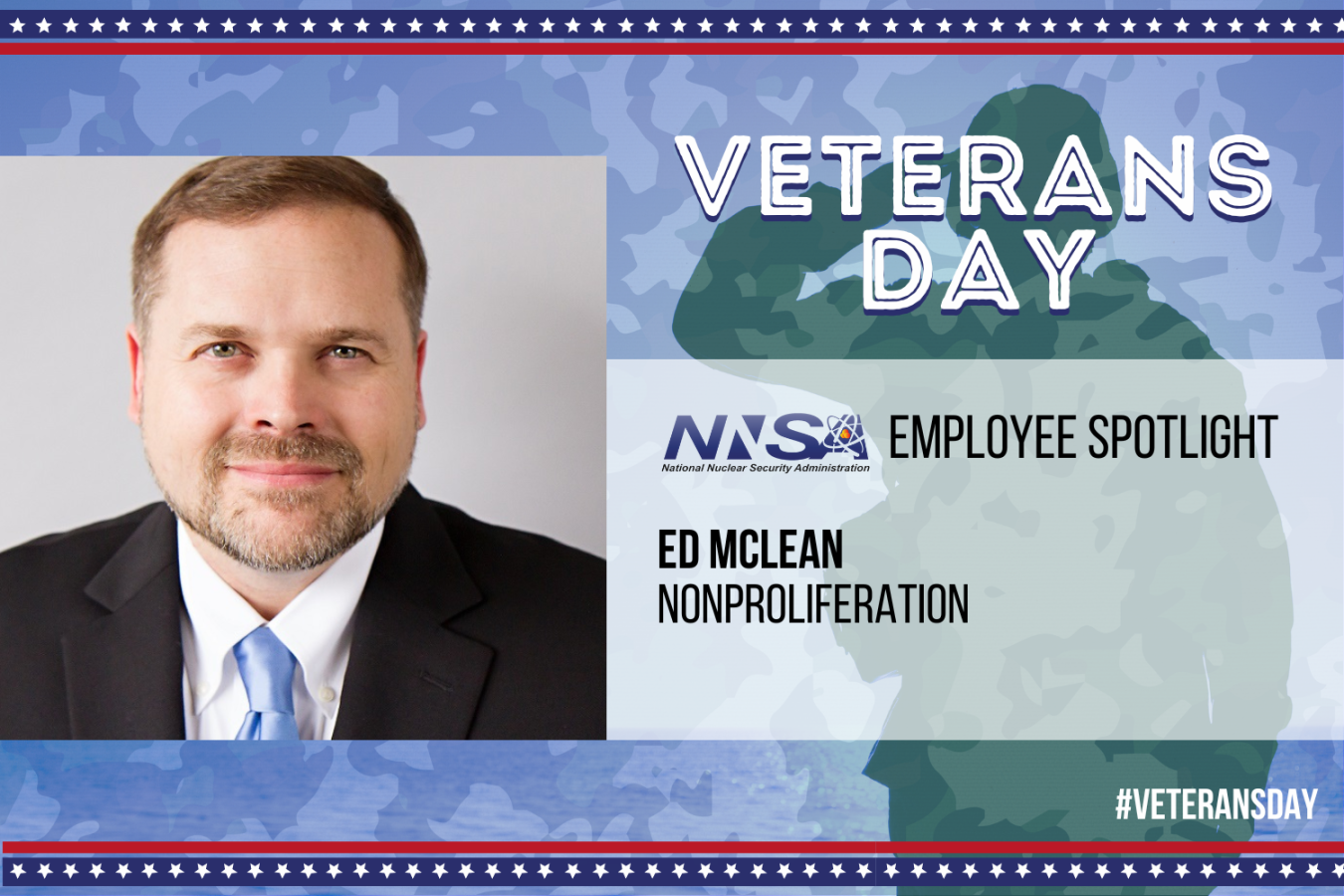Meet Ed McLean. His family lawyer and his father influenced him deeply and positively. His service in the U.S. Air Force prepared him to help NNSA's Office of Global Material Security improve its processes and run more efficiently.
National Nuclear Security Administration
November 14, 2024
How do you support NNSA?
I work for the Office of Global Material Security’s (GMS) Front Office on the Innovation Analysis Team. My work focusses on new technology that can be used to enhance nuclear security. I also provide process improvement recommendations and develop software tools to help the organization run more efficiently and with greater accuracy. Because of my background in cybersecurity, I provide recommendations and support to the GMS front office. I am also a member of the Office of Defense Nuclear Nonproliferation Cyber Council, which looks at policy and procedures in cybersecurity; currently it is looking at artificial intelligence and disinformation.

What is your personal background, and how has that shaped you and your approach to your career?
I grew up in southern Maine. My mother worked for Blue Cross/Blue Shield as a secretary and my father for IBM as service technician. Neither one had a college education, but they always encouraged me to excel in school and get one. Because of my father’s job, I was exposed to computers and programming early, which led to additional opportunities that I probably wouldn’t have had otherwise.
My parents introduced me to the family lawyer when I was about 10, and I fell in love with the idea of being an attorney. I spent the next 12 years working toward that goal, but after running out of money to pay for school, I joined the Air Force as a linguist and fell in love with that job. It sent me on a very different trajectory.
What did you study in school and how did it impact you personally and professionally?

My first bachelor’s degree was in pre-law/history with a political science minor. When I transitioned to the officer ranks and entered ROTC, I earned a second bachelor’s degree, this time in Spanish with a French minor. Later, I got a master’s in business administration (MBA) and an associate’s degree in intelligence operations. I also worked earned a Lean Six Sigma Black Belt (LSSBB).
The MBA had the greatest impact on my work, as I’m able to look across the organization and understand processes and activities more holistically and objectively. I use the LSSBB skills frequently as I participate in projects to improve efficiently and effectiveness.
What led you to a career in nuclear security?
It really is the culmination of experiences and skills that led me here. My linguist position led me to get a commission as an Intelligence Officer. That led me becoming a Special Security Officer as an additional duty. After leaving active Air Force duty, I led multiple projects at the Department of Defense, including the establishment of processes, procedures, and policies. When I retired from federal service, I worked on a project that formally tied together my informal experience with computers and databases, which led to a cybersecurity position at a national lab supporting cybersecurity-focused projects.
So, when you bring the intel, personnel and physical security, cybersecurity, process improvement, and project management all together, that’s how I ended up here.
What is the best part about your job?
I can focus on having a significant, positive impact. GMS leadership has allowed me to do that with process improvement initiatives. That’s been a highlight for me.

Tell us something interesting about yourself.
My father, grandfather, and uncles all raced cars and it had a big impact on me. I started racing an MGB in 1987 and eventually made my way into Formula cars, culminating with getting a pro racing license in Europe.
After returning to the United States, I got involved in endurance racing (Le Mans-style racing where the shortest races are 8 hours). I reached out to veteran organizations and arranged to have a couple of veterans participate as crew members for several racing teams. The teams loved the veteran participation, which led a team owner approaching me to start an all-veteran team.
While the veterans wanted to participate, very few had the needed experience, so I ended up working with a veterans charity to establish a veteran driver and crew development program. The program now has two cars (one fully prepared race car and a “training” car for coaching) and has worked with veteran racing programs across the country. One of our latest efforts led to four veteran members getting a chance to go be part of four teams running in the Baja 1000 race.
What advice would you have for anyone interested in a career in public service?
Be open to learning new things and accepting (and acting upon) opportunities in areas that you haven’t previously considered. It will open doors and let you experience a whole new world!
Who is someone that inspires you and why?
Two men had the most influence on my life: my dad and our family attorney.
- My dad was incredibly levelheaded and a real renaissance man – he knew how to do it all (fixing a computer and two-way radios, plumbing, electricity, fixing and racing cars, building and flying model planes, and a lot more). He had a huge influence on me and what I have accomplished.
- Our lawyer, Fred Williams, inspired me to look at becoming an attorney. Fred was a Tuskegee Airman in World War II, the first African-American attorney to practice in Maine, a Baptist minister, professor at a local college, and served as president of the Maine State Bar Association. He even marched in Selma, Alabama, in the 1960s with Dr. Martin Luther King, Jr. He was truly remarkable.
How do you plan to commemorate Veterans Day?
I will be heading to a track in West Virginia to participate in a racing event for veterans.

